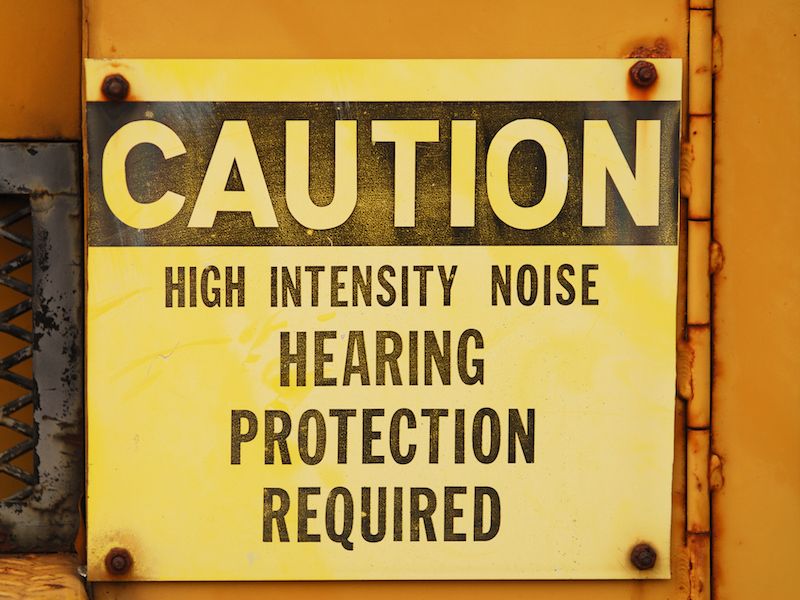
It’s one thing to recognize that you need to protect your ears. It’s a different story to know when to protect your hearing. It’s not as easy as, for example, knowing when to use sunblock. (Are you going to go outdoors? Is the sun out? You need to be using sunscreen.) It’s not even as easy as knowing when to use eye protection (Doing some hammering? Cutting some wood or working with hazardous chemicals? Wear eye protection).
It can feel as though there’s a large grey area when addressing when to use hearing protection, and that can be dangerous. Frequently, we’ll defer to our natural tendency to avoid hearing protection unless we have information that a particular activity or place is dangerous.
Risk Assessments
In general, we’re not very good at assessing risk, especially when it comes to something as intangible as injury to the ears or the probability of permanent sensorineural hearing loss. To prove the point, check out some examples:
- A very loud rock concert is attended by person A. The concert lasts around 3 hours.
- Person B owns a landscaping company. After mowing lawns all day, she goes home and quietly reads a book.
- Person C is an office worker.
You might believe the hearing hazard is greater for person A (let’s just call her Ann). For the majority of the next day, her ears will still be ringing from the loud performance. Assuming Ann’s activity was dangerous to her hearing would be fair.
Person B (let’s just call her Betty), on the other hand, is exposed to less noise. There’s no ringing in her ears. So it must be safer for her hearing, right? Well, not quite. Because Betty is mowing all day. So even though her ears never ring out with pain, the injury accrues slowly. Even moderate noise, if experienced regularly, can harm your ears.
Person C (let’s call her Chris) is even less clear. The majority of individuals understand that you need to safeguard your hearing while using equipment like a lawnmower. But while Chris works in a quiet office, she has a really noisy, hour-long commute every day through the city. Additionally, although she works behind her desk all day, she listens to her music through earbuds. Is protection something she should think about?
When You Should Worry About Protecting Your Ears
The general guideline is that if you have to raise your voice to be heard, your surroundings are noisy enough to do damage to your hearing. And if your surroundings are that noisy, you really should consider using earplugs or earmuffs.
If you want to think about this a little more clinically, you should use 85dB as your cutoff. Noises above 85dB have the capacity, over time, to cause injury, so you should consider using ear protection in those situations.
Your ears don’t have their own sound level meter to warn you when you get to that 85dB level, so most hearing specialists suggest getting special apps for your phone. These apps can show you when the surrounding noise is nearing a harmful level, and you can take proper steps.
A Few Examples
Your phone may not be with you wherever you go even if you do download the app. So we might formulate a good baseline with a couple of examples of when to protect our hearing. Here we go:
- Listening to music with earbuds. OK, this doesn’t call for protection but does require caution. Give consideration to how loud the music is, how long you’re playing it, and whether it’s going directly into your ears. Noise-canceling headphones are a great choice to steer clear of needing to turn the volume way up.
- Domestic Chores: We already talked about how something as simple as mowing the lawn, when done frequently, can call for hearing protection. Cutting the grass is a good illustration of the kind of household chore that might cause damage to your ears but that you most likely won’t think about all that often.
- Operating Power Tools: You recognize you will want hearing protection if you work all day in a factory. But how about the enthusiast building in his workshop? Most hearing specialists will suggest you wear hearing protection when operating power tools, even if it’s just on a hobbyist basis.
- Exercise: Your morning spin class is a good example. Or maybe your daily elliptical session. You may think about wearing hearing protection to each. Those trainers who make use of microphones and sound systems (and loud music) to motivate you might be good for your heart rate, but all that volume is bad for your ears.
- Driving & Commuting: Spending all day as an Uber or Lyft driver? Or maybe you’re just hanging around downtown for work or boarding the subway. The constant noise of living in the city, when experienced for between 6 and 8 hours a day, can cause injury to your ears over the long term, especially if you’re cranking up your music to hear it over the commotion.
These illustrations may give you a good baseline. If there is any doubt, however, use protection. Rather than leaving your ears exposed to future harm, in most situations, it’s better to protect your hearing. If you want to be able to hear tomorrow, protect today.